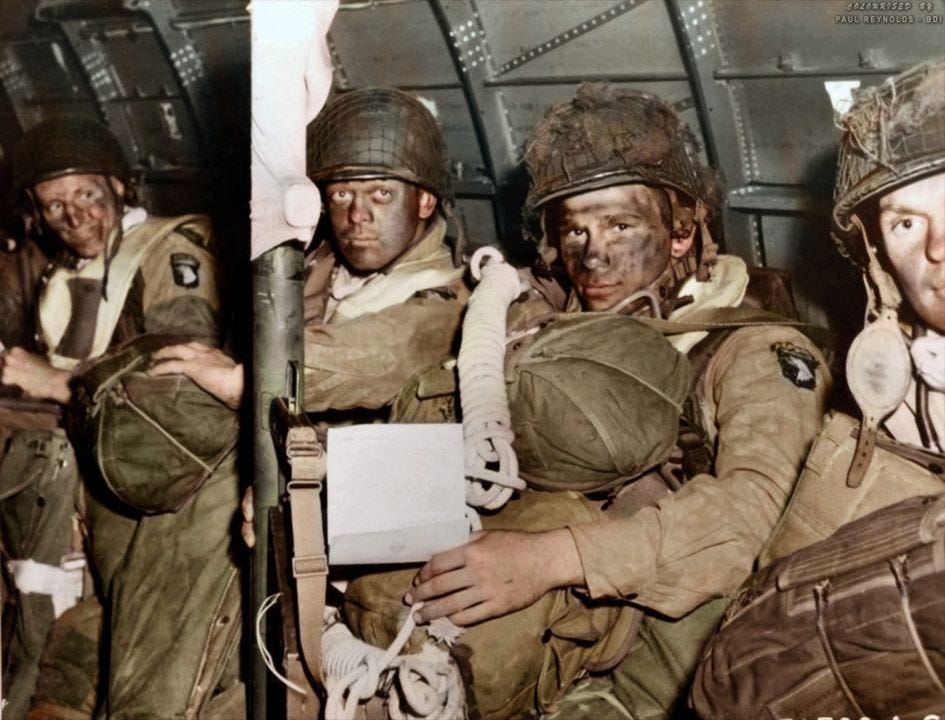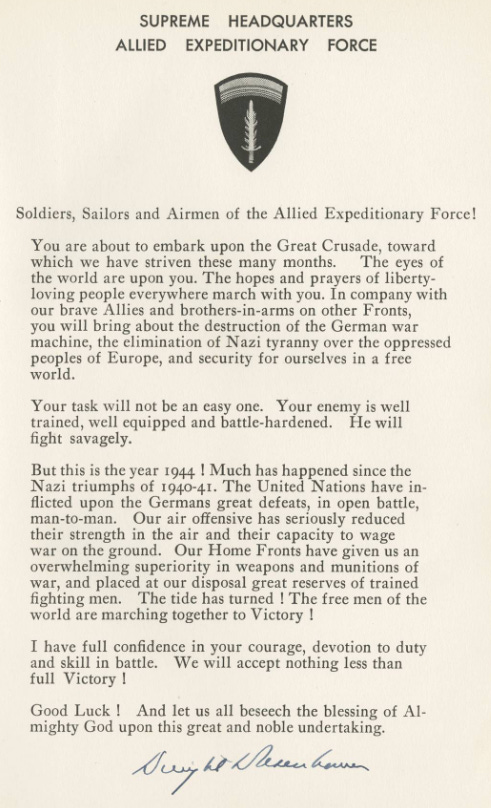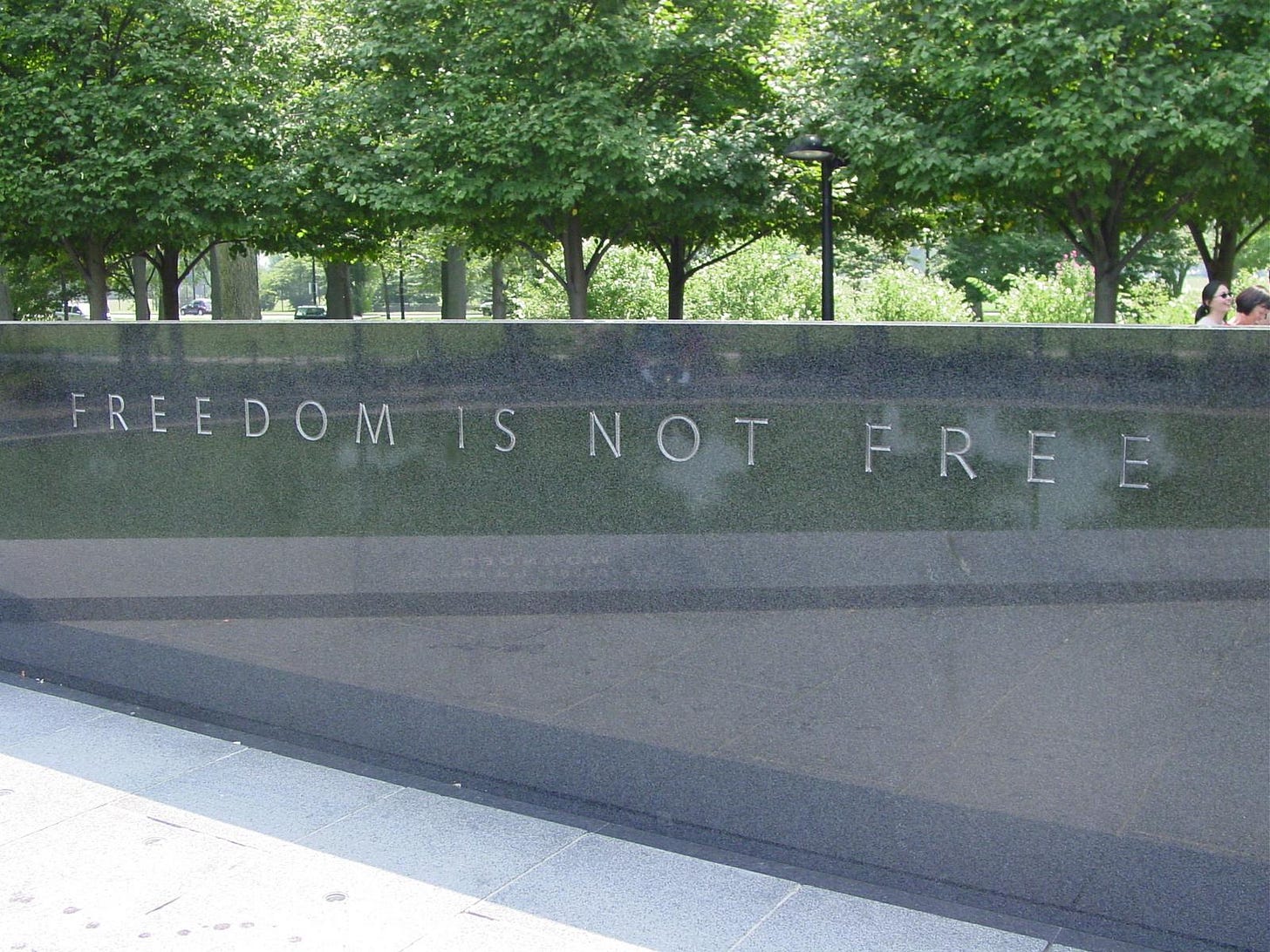Honoring our military veterans
U.S. military veterans have left an indelible mark on history, society, and global peace.
United States military veterans, who have served in various conflicts from World War I to contemporary operations, have left an indelible mark on history, society, and global peace. Every November 11, America honors their service and sacrifice on Veterans Day.
Since my grandfather—Charles Barber—fought in World War II, I have spent many hours researching his service and the overall history of the war, particularly the European Theater of Operations (1942-1945).
The following is a short story about the large group of American veterans who fought valiantly 80 years ago for European peace.
Early on June 6, 1944, roughly 13,000 paratroopers parachuted behind entrenched enemy lines ahead of 135,000 US, British, and Canadian soldiers. Operation Overlord, also known as D-Day, marked the beginning of the liberation of France and Western Europe from Nazi occupation during World War II.

The invasion involved over 150,000 troops from the United States, Canada and the United Kingdom, who landed on the beaches of Normandy, France. The operation was supported by a massive naval force and air support, with more than 11,000 aircraft involved. It remains the largest amphibious invasion in history.

The landings were divided into five sectors: Utah, Omaha, Gold, Juno, and Sword. Each sector was assigned to a different Allied force. The American forces landed at Utah and Omaha, the British at Gold and Sword, and the Canadians at Juno.
Despite facing heavy resistance from German forces, the Allies managed to establish a foothold in Normandy. By the end of the day, they had landed more than 150,000 troops and secured several beachheads.
Early in the morning of June 6, 1944, Americans heard on their radios that thousands of American and British soldiers had landed on the beaches of northern France. It wasn't until later that the brutality of the largest amphibious landing of all time was fully understood. Over 4,400 troops were killed on D-Day—including 2,501 Americans—with over 73,000 lost in the ensuing monthlong Battle of Normandy.
The D-Day landings were a turning point in the war. It allowed the Allies to open a second front against the Axis powers in Europe, relieving pressure on the Soviet Union and setting the stage for the eventual liberation of Western Europe.
Last December, I wrote about the passing of the ‘Greatest Generation’ and my grandfather. If you’d like to reach the short newsletter, click the image below.
Veterans Day Speech - Nov. 11, 1985
On Nov. 11, 1985, President Ronald Reagan provided Veterans Day remarks at the Arlington National Cemetery’s amphitheater in Arlington, Virginia.
Secretary Weinberger, Harry Walters, Robert Medairos, reverend clergy, ladies and gentlemen, a few moments ago I placed a wreath at the Tomb of the Unknown Soldier, and as I stepped back and stood during the moment of silence that followed, I said a small prayer. And it occurred to me that each of my predecessors has had a similar moment, and I wondered if our prayers weren't very much the same, if not identical.
We celebrate Veterans Day on the anniversary of the armistice that ended World War I, the armistice that began on the 11th hour of the 11th day of the 11th month. And I wonder, in fact, if all Americans' prayers aren't the same as those I mentioned a moment ago. The timing of this holiday is quite deliberate in terms of historical fact but somehow it always seems quite fitting to me that this day comes deep in autumn when the colors are muted and the days seem to invite contemplation.
We are gathered at the National Cemetery, which provides a final resting place for the heroes who have defended our country since the Civil War. This amphitheater, this place for speeches, is more central to this cemetery than it first might seem apparent, for all we can ever do for our heroes is remember them and remember what they did -- and memories are transmitted through words.
Sometime back I received in the name of our country the bodies of four marines who had died while on active duty. I said then that there is a special sadness that accompanies the death of a serviceman, for we're never quite good enough to them-not really; we can't be, because what they gave us is beyond our powers to repay. And so, when a serviceman dies, it's a tear in the fabric, a break in the whole, and all we can do is remember.
It is, in a way, an odd thing to honor those who died in defense of our country, in defense of us, in wars far away. The imagination plays a trick. We see these soldiers in our mind as old and wise. We see them as something like the Founding Fathers, grave and gray haired. But most of them were boys when they died, and they gave up two lives -- the one they were living and the one they would have lived. When they died, they gave up their chance to be husbands and fathers and grandfathers. They gave up their chance to be revered old men. They gave up everything for our country, for us. And all we can do is remember.
There's always someone who is remembering for us. No matter what time of year it is or what time of day, there are always people who come to this cemetery, leave a flag or a flower or a little rock on a headstone. And they stop and bow their heads and communicate what they wished to communicate. They say, "Hello, Johnny," or "Hello, Bob. We still think of you. You're still with us. We never got over you, and we pray for you still, and we'll see you again. We'll all meet again." In a way, they represent us, these relatives and friends, and they speak for us as they walk among the headstones and remember. It's not so hard to summon memory, but it's hard to recapture meaning.
And the living have a responsibility to remember the conditions that led to the wars in which our heroes died. Perhaps we can start by remembering this: that all of those who died for us and our country were, in one way or another, victims of a peace process that failed; victims of a decision to forget certain things; to forget, for instance, that the surest way to keep a peace going is to stay strong. Weakness, after all, is a temptation -- it tempts the pugnacious to assert themselves -- but strength is a declaration that cannot be misunderstood. Strength is a condition that declares actions have consequences. Strength is a prudent warning to the belligerent that aggression need not go unanswered.
Peace fails when we forget what we stand for. It fails when we forget that our Republic is based on firm principles, principles that have real meaning, that with them, we are the last, best hope of man on Earth; without them, we're little more than the crust of a continent. Peace also fails when we forget to bring to the bargaining table God’s first intellectual gift to man: common sense. Common sense gives us a realistic knowledge of human beings and how they think, how they live in the world, what motivates them. Common sense tells us that man has magic in him, but also clay. Common sense can tell the difference between right and wrong. Common sense forgives error, but it always recognizes it to be error first.
We endanger the peace and confuse all issues when we obscure the truth; when we refuse to name an act for what it is; when we refuse to see the obvious and seek safety in Almighty. Peace is only maintained and won by those who have clear eyes and brave minds. Peace is imperiled when we forget to try for agreements and settlements and treaties; when we forget to hold out our hands and strive; when we forget that God gave us talents to use in securing the ends He desires. Peace fails when we forget that agreements, once made, cannot be broken without a price.
Each new day carries within it the potential for breakthroughs, for progress. Each new day bursts with possibilities. And so, hope is realistic and despair a pointless little sin. And peace fails when we forget to pray to the source of all peace and life and happiness. I think sometimes of General Matthew Ridgeway, who, the night before D-day, tossed sleepless on his cot and talked to the Lord and listened for the promise that God made to Joshua: “I will not fail thee, nor forsake thee.”
We're surrounded today by the dead of our wars. We owe them a debt we can never repay. All we can do is remember them and what they did and why they had to be brave for us. All we can do is try to see that other young men never have to join them. Today, as never before, we must pledge to remember the things that will continue the peace. Today, as never before, we must pray for God's help in broadening and deepening the peace we enjoy. Let us pray for freedom and justice and a more stable world. And let us make a compact today with the dead, a promise in the words for which General Ridgeway listened, “I will not fail thee, nor forsake thee.”
In memory of those who gave the last full measure of devotion, may our efforts to achieve lasting peace gain strength. And through whatever coincidence or accident of timing, I tell you that a week from now when I am some thousands of miles away, believe me, the memory and the importance of this day will be in the forefront of my mind and in my heart.
Thank you. God bless you all, and God bless America.
From the trenches of World War I to the deserts of the Middle East, American military veterans have fought against tyranny, fascism, communism, and terrorism. Their legacy is a reminder of the cost of freedom and the heights of human achievement when driven by a sense of duty and honor.
To the military veterans reading this newsletter: Thank you!






